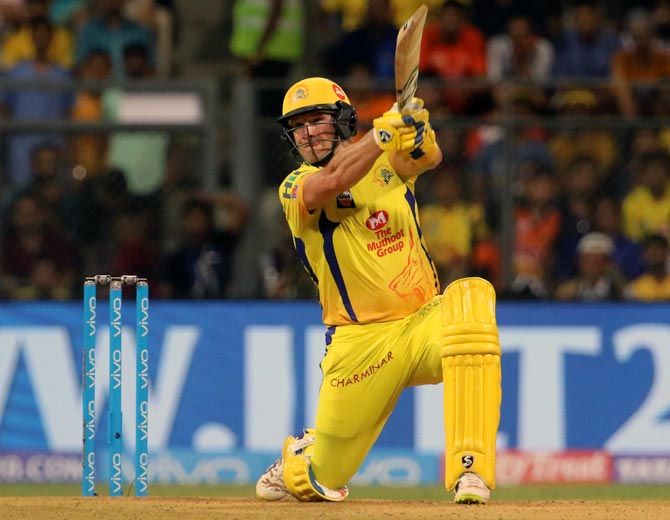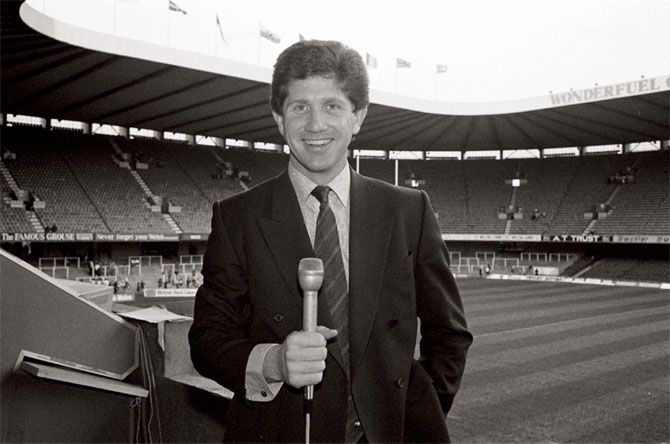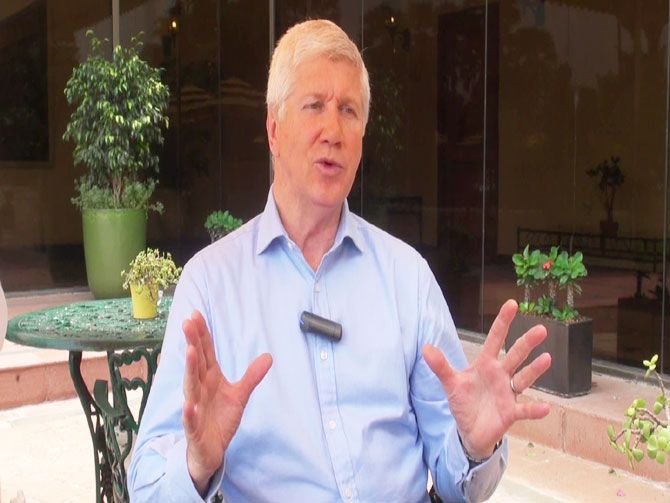'T20 cricket is popular because everything is faster and people want things quicker.'
'Test cricket is going to battle, but I would like to think that it is going to be around and stay around because if you ask Virat Kohli what gives him ultimate pleasure, it would be playing Test cricket for India.'

In Part 1 of an exclusive interview with with Rediff.com/Norma Godinho, commentator Alan Wilkins spoke about his journey from cricketer to commentator and what it's like working with Geoff Boycott, Sunil Gavaskar and Harsha Bhogle in the commentary box.
In the concluding part of this fascinating interview, Wilkins reveals how T20 cricket has made athletes out of cricketers and how day-night contests could inject life back into Test cricket.

As with cricketers, commentators can also have off days on assignments, and Alan Wilkins has no qualms in accepting that fact, something he acknowledged in his memoir, Easier Said Than Done (Roli Books).
For a man so thorough in his job, the Welshman has accepted that he has had his share of embarrassments.
"I'm sure I've made a few (goof-ups). Sometimes there are words that don't come out properly. I remember I once tried to say something and the word 'obnoxious' came out. And I have no idea why I've used it because it's not a word in my vocabulary to use in a sports broadcast."
"There is a story in the book where I was presenting for BBC Wales, it was a football tournament and I hadn't done my homework, that's the thing, I hadn't done my homework and I was describing a striker with the chairman of the club. I said to the chairman, 'Well this striker, what a wonderful player he is, he scores goals from anywhere, he's so talented, must be wonderful to watch him play in this tournament. He then he said: 'You're absolutely right, Alan. But he doesn't play for us, he plays for them.' And I was live on air."
How does he deal with something like that?
"You've got to move on. If you've made a faux pas or said the wrong thing or your interview is not going well, you have to have the courage and conviction in your own ability to move on," he says.

From within the confines of the commentary box Wilkins has seen cricket change and grow. In his book Wilkins remembers cricketers were hardly athletes back in the day, but with the dawn of T20 cricket, he says there is a marked shift in that view.
"The way you see fielders diving around the ball, the catching is spectacular, and it's exemplified by what we see in the IPL. In the past, no one played cricket with such athleticism. The West Indies were fantastic cricketers. Vivian Richards was a fabulous fielder and there were individual fielders -- Derek Randall of England was a great fielder, Australia had their own fielders."
Wilkins believes with the monetary incentives that come with modern-day cricket cricketers have to stay fit, give it their all or lose out.
"The financial incentives in cricket are so high now that if you don't adopt the right attitude, if you're not a cricket athlete, you're gonna miss out. And the money is there. Look at the money that some of the foreign players make, look at the money some of the Indian players get in the IPL."
"If you are a young player coming into the game, if you don't subscribe to the regime of being an athlete you're going to be left behind and financially you will lose out."
With so much money at stake, Wilkins says injury can cause gloom and mental fatigue.
"The mental side of having a bad injury, I'm sure there are many athletes, cricketers who'd tell you that it is very difficult. Especially when you lose a bit of confidence."
"The scrutiny on modern cricketers is much more intense because of social media, phones, videos etc. They are always in the public eye. Being in the public eye can be daunting. The stakes are so high now, the financial rewards so great that if you don't keep up, you'll get left behind or if you fall out, it gets more difficult to get back on the wagon."

Like any cricketer, who is or has been a bowler, Wilkins believes the game is tilted heavily in favour of batsmen.
"If I could change something I would try and give bowlers something more in the game because batsmen have it too easy. I don't think all the batsmen will agree with that, but I do think that the bat dominates the ball too much, especially as a seamer."
"I think seamers get hit terribly. So I would like to see the contest evened up even if it is the pitch that is left with a little bit more grass."
"But you know, the crowds come in and fill the stadiums, because they want to see the ball flying out of the ground. So when you see A B de Villiers smashing out of the park or Chris Gayle do it, they'd rather see that ball flying. And it does looks dramatic, the white ball flying everywhere."
"But as a bowler, if you are a seam bowler and you are at the end of that, it hits you mentally. But see, leg spinners have such success so batsmen would say why would you even up the playing field because spin bowlers are doing so well?"
"I just think that seam bowlers, to get the yorker in, it's just such a small margin of error, seamers get hit and so I'd like to see the contest evened out 'cause I'm a seam bowler."
Although he he has never represented England in Test cricket, Wilkins is worried about the death of Test cricket with the popularity of shorter forms of the game.
"We have to be careful where T20 is going because we have T10s coming up now. T20 cricket is popular because everyone's lives are speeded up. Everything is faster and people want things quicker."
"Test cricket is going to battle, but I would like to think that it is going to be around and stay around because if you ask Virat Kohli what gives him ultimate pleasure, it would be playing Test cricket for India."
"As an ex-cricketer I say we must ensure that the longer format stays with us."
So are Day-Night Tests and pink ball cricket the way forward?
"Pink ball cricket is not a gimmick. I think it started out as a good idea by cricket boards to try and salvage Test cricket. Dwindling crowds."
"Now, when we had the first pink ball Test in Adelaide, the ground was full.
"If Test cricket has to survive, it has to embrace change, it has to embrace new ideas."
"Test cricket when it started after the second World War, cricket was a way where in Australia and England people came back to life after the terrible years of the war. Often they would go into stadiums virtually free. So that is why you saw great cricket grounds like the SCG, MCG, Lord's and Edgbaston full because you had all these people who just had the ravages of war."
"We have to be careful and preserve the game of Test cricket. I would hate it if we lost Test cricket. To me it's still the game to play."











